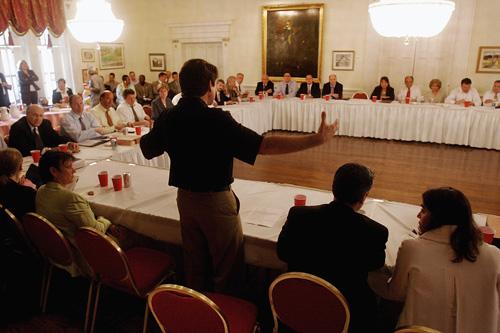Illinois budget talks give way to series of stunts, no progress made

Illinois Gov. Rod Blagojevich speaks with lawmakers at the Executive Mansion in Springfield on Tuesday, while attempting to reach a state budget agreement. No signs of progress have been made. Seth Perlman, The Associated Press
July 16, 2007
SPRINGFIELD, Ill. – Putting together the Illinois state budget is usually a dull mixture of number-crunching and painstaking negotiations. Not this year.
State leaders, notably Gov. Rod Blagojevich and House Speaker Michael Madigan, have transformed it into a series of stunts designed to embarrass and pressure one another.
The governor argues about the timing of House sessions. The speaker drags dozens of lawmakers to budget meetings. The governor challenges the House on gun control. The speaker hand-delivers letters to the governor’s Senate allies.
Despite the fireworks, there’s no sign of movement toward a budget deal. Officials haven’t even agreed on the size of the shortfall they face, a vital step in deciding how to fill the hole and whether to add new programs.
The result of the gamesmanship could have a huge impact on Illinois residents’ health care, schools and taxes for years to come. It also will establish the direction of Blagojevich’s second term.
Get The Daily Illini in your inbox!
Some lawmakers see the unorthodox tactics as attempts to shake things up at the Capitol, where the situation hasn’t changed since May.
“I think it’s frustration,” said Rep. Kurt Granberg, D-Carlyle. “People are looking for any way to break the deadlock, so they’re trying to exhaust all their options, to change the dynamic of what’s going on.”
What’s going on is that Blagojevich and Senate President Jones, both Chicago Democrats, have joined forces to seek new money for education and health care. They’ve proposed a $5 billion mixture of business taxes and gambling expansion to pay for it.
But they haven’t been able to round up enough Senate support to pass most of the proposals. And Madigan says even if they were sent over to the House, they would fail there. He favors a budget increase of roughly $1 billion, using natural revenue growth and ending some tax breaks for businesses.
Republican leaders, who favor a budget closer to Madigan’s proposal, are largely sitting back and watching the Democrats implode.
Blagojevich and Madigan describe their stunts as legitimate, even necessary. They may be right that some of these moves will help. Others, however, seem counterproductive.
Take Blagojevich’s public demand that the House vote on legislation to limit the size of ammunition clips.
The demand was widely seen as a diversion and an attempt to sow discord among House Democrats. Even the measure’s sponsor said it was a bad idea. Some lawmakers responded by challenging the governor to call a special session on strengthening Illinois ethics laws.
Blagojevich defends his decision as a good use of lawmakers’ time. He denied it makes angry lawmakers less likely to support his health plan.
“I can’t believe any legislator would vote against health care, if they think it’s the right thing to do, because they might not agree with me on banning assault weapons,” he said in an Associated Press interview.
He also distanced himself from another unpopular move: threatening legal action because the Illinois House held a special session at 10 a.m. instead of 2 p.m. as his executive order specified. One lawmaker called him “insane” for making an issue over the time.
“That’s a lawyers’ thing. They’ll figure that out,” he said in the interview. Asked if his lawyers take their instructions from him, Blagojevich said, “Not really.”
Officials have clashed not only on the budget but on holding budget talks.
Madigan refused to meet with Blagojevich for more than two months after the governor released his budget proposal. Once talks began, Republican leaders were not invited.
Later, when talks had stalled, Madigan invited the entire House to accompany him to the governor’s office to monitor negotiations. The governor’s aides scrambled to accommodate the guests, eventually moving talks to the governor’s mansion and whipping up a quick spaghetti meal.
Including rank-and-file lawmakers may not have produced any concrete results yet, but most people like the idea. Blagojevich and Madigan each say it lets lawmakers see how unreasonable the other leader is.
Blagojevich has taken to calling Madigan, who heads the Illinois Democratic Party, a “George Bush Republican” who is scheming with Republican lawmakers to block action on schools and health care.
It’s an attempt to drive House Democrats away from the speaker’s position and toward the governor’s. It also could lay the groundwork for some future challenge to Madigan’s authority by arguing he’s not a true Democrat.
Not to be outdone, Madigan took the unusual step of making personal visits to Democratic state senators – ones Blagojevich hopes to keep on his side _ to deliver letters pointing out how much Chicago schools would benefit from the House budget plan.
Madigan spokesman Steve Brown called the visits a gesture of “respect for the members.” They also could be seen as an attempt to divide Senate Democrats and keep them from embracing the governor’s plan.
Madigan and Blagojevich are arguing over very real policy differences. Blagojevich sees health care as critically important; Madigan wants to avoid further government debt and red ink.
But they also may be arguing over who calls the shots for the next four years. Can the governor unveil major programs and just expect lawmakers to go along, or will he have to come to Madigan and seek support?
Rep. Eddie Washington, D-Waukegan, is confident the two will find some way to work together sooner or later.
“They have to,” he said. “It’s almost like being shackled together. Nobody can go a different direction. You’ve got to be going the same direction eventually.”






